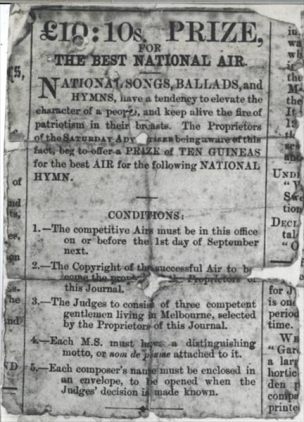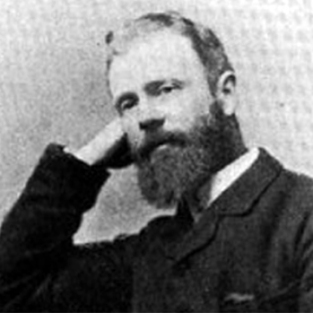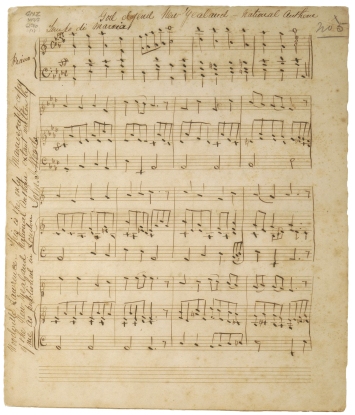In 1876, the New Zealand Saturday Advisor, a Dunedin newspaper held a competition to write music for a five-stanza patriotic poem entitled “National hymn” written by a poet named Thomas Bracken who also happened to be the editor of the paper. The music competition was to last several months and be judged by three prominent Melbourne musicians with a prize of ten guineas (roughly $20 today) to go to the winner.
John Joseph Woods, a schoolteacher in the small town of Lawrence, New Zealand habitually met the coach that delivered the newspaper each night. On the particular winter night that the competition was announced, he received the paper, read about the competition and immediately went home—it was already nine o’clock—and composed a melody for the poem at a single sitting at his piano.
He claimed that the words were so inspiring that he felt compelled to work that night until the music was completed.
Months later when the competition concluded, the three judges unanimously proclaimed Woods the winner. The name of the song was “God Defend New Zealand”, and it was first performed on Christmas Day 1876 in Dunedin by the Lydia Howarde Burlesque and Opera Buffe Troupe accompanied by the Royal Artillery Band—in case you wanted to know.
Being a choirmaster, Woods had made the song simple to sing for everyone including children, and throughout the 19th and early 20th century, the song rapidly grew in popularity. The New Zealand government bought the rights to the song in 1940. In 1972, God Defend New Zealand, being called a national hymn, was played at the 1972 Summer Olympics in Munich. This only added to its popularity and an attempt was made to make it the country’s national anthem, replacing “God Save the Queen”; instead in 1977 Parliament made it the country’s second national anthem, on equal standing with “God Save the Queen”.
Some have criticized the religious overtones of “God Defend New Zealand”, but for most it is a well-loved song and the more popular of the two anthems.
As an aside, this distinction of having two national anthems is also shared with Denmark and Canada. Not a bad idea as far as I can tell. Let’s say you’re singing the national anthem and the register gets too high (you know like in the “Star Spangled Banner” with that part “..and the rocket red’s glare”) or you forget the words, why heck, you can just switch to your other national anthem.
Shortly after the poem was put to music, a Maori version, not a direct translation of the English version, was also written called “Aotearoa” but sung to the same music. At public events or large sporting events, the current practice is for the first verse to be sung in Maori followed by the next verses in English.
Maori first verse “Aotearoa”
E Ihowa Atua,
O nga iwi matou ra
Ata whakarongona;
Me aroha noa
Kia hua ko te pai;
Kia tau to atawhai;
Manaakitia mai
Aotearoa
English first verse “God Defend New Zealand”
God of nations! at Thy feet
In the bonds of love we meet,
Hear our voices, we entreat,
God defend our Free Land.
Guard Pacific’s triple star,
From the shafts of strife and war,
Make her praises heard afar,
God defend New Zealand
Beautiful singing of New Zealand’s national anthem, “God Defend New Zealand”, by Cindy Ruakere accompanied by dramatic photography of New Zealand.
1) Alexander Turnbull Library, John Joseph Woods Collection Reference: MS-Papers-0355
2)http://commons.wikimedia.org/wiki/File%3AGod_Defend_New_Zealand_manuscript_cropped.jpg By John Joseph Woods [Public domain, Public domain or Public domain], via Wikimedia Commons



